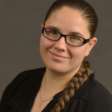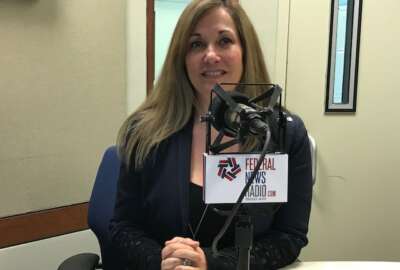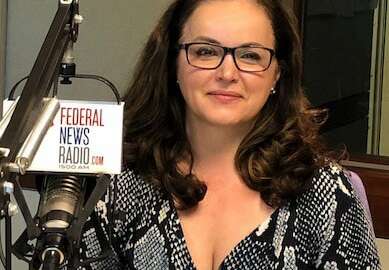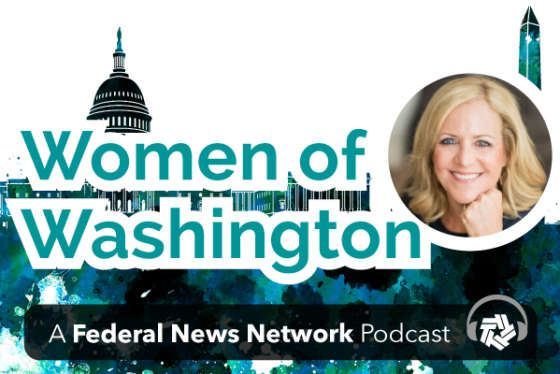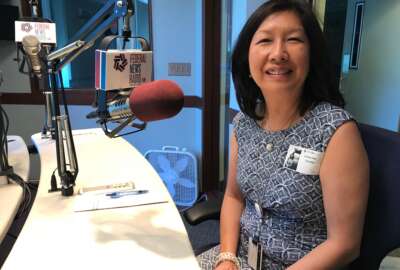
A crusader for managing data, at work & at home
HHS OIG's Kirsten Dalboe, an advocate for information, labeling herself as somewhat of a data 'enabler,' joins Gigi Schumm on Federal News Radio's Women of...
Best listening experience is on Chrome, Firefox or Safari. Subscribe to Women of Washington’s audio interviews on Apple Podcasts or PodcastOne.
A strong foundation and common language are important in all areas of government. It all starts with how information is collected and sorted, according to one federal data operations manager.
On this week’s episode of Women of Washington, Gigi Schumm welcomed Kirsten Dalboe, director of data operations at the Health and Human Services Department’s Office of Inspector General. Dalboe has long been an advocate for information, labeling herself as somewhat of a data ‘enabler.’
She said her job is all about making sure the right data is available for the right people, at the right time.
“You need to make sure you know what you have, where you got it from, when you got it and why you have it,” Dalboe said. “People can understand terms under different context, so [also] making sure that you can bring all the stakeholders together and say, ‘you’re all using the same term in your data dictionary … but do you all mean the same thing?’ Being able to write all of that down is part of the process.”
Before taking on her position within HHS OIG, she worked on the Data Management Cube team within the Homeland Security Department. In this role, as the idea of cloud computing was still in its infancy, Dalboe said she had challenges convincing her team, and the department, of the value in data management.
Sometimes people are just anxious to jump into a project. But it’s impossible to succeed without a steady foundation. Dalboe said a lot of analytics projects crumble because the team may have failed to document information.
“It starts out nice because people do some prototyping and people get excited and then all of a sudden there’s what looks like a full production system that hasn’t really been documented or tested, and no one really knows where the source came from,” she said.
The best way to avoid this? Write it down.
Dalboe’s career has been centered on this concept. The unintended benefits of defining the reason and data behind an analysis force a conversation between stakeholders that is essential to the process. There is never only one way to look at data or use it. Bringing the different people together opens that door to the possibilities.
“There’s also kind of a quality piece that comes along as well, which always makes me secretly happy when I see that happen because I think these are also the benefits that happen along the way where people start realizing that there could be another way to look at it,” she said. “People are so used to working in their own communities on their own projects that they’ve not really thought to reach across to another group [or] another organization.”
This way of thinking has earned Dalboe several nominations and awards, such as a NextGen Public Service Award for delivering the first secure, cloud-based application within HHS, called the HHS OIG Enterprise Dashboard.
Defining work-life balance
Dalboe didn’t have to uproot her life to work for the federal workforce. In fact, she was born in Georgetown Hospital and raised in Reston, Virginia.
Her data skills have come in handy at home also — especially when raising triplet boys. Having family in the area has also made her work-life balance a little easier. Dalboe said working for the federal government has given her the flexibility she needs to raise her kids.
What is her management and parenting style? Lead and they will follow.
“I’m a believer in modeling the behavior that you expect from people and trusting that they are here to do that, to do a job that they are qualified to do,” she said. “I don’t want to be a micromanager, but I do want to see proof that things are happening.”
While raising three kids and holding an entire team together within HHS, she still makes time for a hobby that could have landed her in a completely different place had she pursued that path instead. Dalboe is also a violinist — an instrument she has played since she was eight — in the Washington Sinfonietta Chamber Orchestra.
She said the orchestra has allowed her to follow her hobby, but still pursue her engineering career.
“It’s actually a really awesome group because it’s got a lot of people, like me, who potentially could have gone professional with their music but wanted to keep it as a hobby,” Dalboe said. “So there are a lot of government workers in there. I think one of my stand partners is a retired NSA analyst, and there’s the HUD program manager and there’s the NIH scientist.”
Dalboe said she is a big believer in following her intuition and she knew the engineering field is where she was being called.
Earlier in her career she often tried to compare herself to others. But no value ever came from that. To avoid this, she developed a 3-to-5 year plan to figure out what she wanted to do and where she wanted to be.
“I’ve actually at points turned down opportunities because it didn’t really align to the path,” she said. “It can be somewhat foggy and it can be changeable. But I also want to make sure that if I do change any path that I’m on, that I want it to be a deliberate choice, and not because I wasn’t thinking and didn’t see that the train stopped.”
Copyright © 2024 Federal News Network. All rights reserved. This website is not intended for users located within the European Economic Area.
Steff Thomas is a digital editor at Federal News Network.

